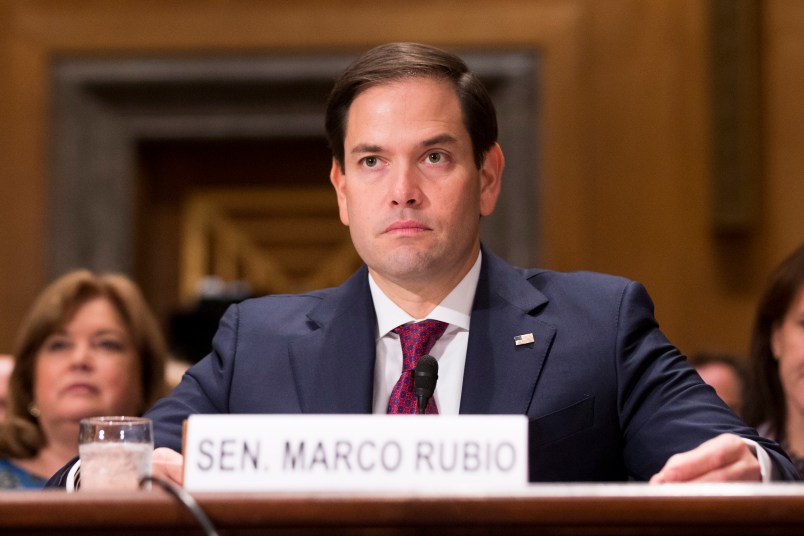Sen. Marco Rubio (R-FL) said Thursday that he won’t vote for his party’s huge corporate tax cut plan unless GOP leaders increase the size of the child tax credit.
“I want to see the refundable portion of the child tax credit increased from its current number,” Rubio told reporters as he entered the Senate floor. “If it stays at $1,100, I’m a no. Let’s hope it doesn’t.”
Though Rubio generally votes the party line, his threat is made with significant leverage. Republicans can only lose two votes from their caucus, meaning his vote could theoretically kill the GOP’s chances at passing the massive legislation. Republicans are running out of time to make the necessary adjustments to win back Rubio’s support if they want to stick to their current timetable and pass the bill next week before disappearing for the holidays.
Rubio has been pushing for the expanded credit along with Sen. Mike Lee (R-UT), who says he is also undecided on the bill, though this moment appears to be more likely a minor snag in the process than one that can derail a top Republican priority.
“Given all the other changes they made to the tax code leading into it, I can’t in good conscience support it unless we are able to increase the refundable portion of it, and there’s ways to do it,” Rubio said, adding that he wants the child tax credit to be fully deductible, but is willing to negotiate on specifics.
It is unclear, however, whether Rubio would follow through on the threat to vote down the tax bill if his demands are not met. President Trump expressed skepticism Thursday, telling reporters at the White House: “I think he’ll get there. He’s really been a great guy, very supportive. I think that Sen. Rubio will be there, very shortly.”
Sen. Bob Corker (R-TN) was the only GOP no vote on the first version of the legislation, which passed the Senate with 51 Republicans votes in early December. On Thursday, he told reporters that while he is officially undecided, “it’ll be very difficult to solve” his concerns that the bill will explode the deficit, and added that he also has concerns about the bill’s corporate tax structure.
Sen. Susan Collins (R-ME) has also voiced concerns about portions of the bill, though she refused Thursday to say how she’s leaning on the final product.
“Why don’t we wait and see what happens?” she told reporters Thursday.
If Collins splits, any one Republican, including Rubio, could torpedo the bill.
Rubio and Lee’s hesitation comes as leadership weighs additional tweaks to the tax bill that would make it even less beneficial to middle- and lower-income Americans, including a change making the tax cuts for individuals expire in 2024 while the bill’s corporate tax cuts remain permanent.
Sen. Mike Rounds (R-SD) acknowledged Thursday that the change is under discussion, telling reporters it might be necessary to make sure the bill doesn’t spill over the $1.5 trillion threshold set by the Senate’s Byrd rules, but he’s confident Congress would vote to extend them in the future.
“The intent all the way along is to do two things: make sure this is Byrd-bath-able and to make darn sure long term that those are in place,” Rounds said. “One way or another, once they get put in place, we’ll be able to keep them.”







Which makes this “no” yet another patented Rubio fraud.
Rube standing by a promise is a pretty tall order to ask from him. He can always tank the bill with 2020 in mind as a champion of working families. (Yeah, I know.)
Marco Rubio: stalwart and upstanding and righteous as he ever was.
Rubio will come around obviously. The big news is that the middle class tax cuts may now expire 3 years earlier in 2024. Unbelievable.
Rule 1: the Republicans always come home.
Rule 1A, 2017 edition: Until a Republican bill is voted on and passed in both houses, not just a bill with the same title but the same bill, and until Donald J. Trump puts his big, beautiful signature on that big with his very large, very masculine hands, the Republicans have not yet come home.